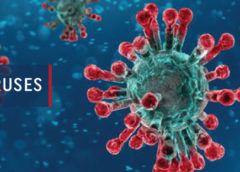What is a Coronavirus?
Coronavirus infections were first identified in the 1960s, but we don’t know where they come from. They get their name from their crown-like shape. Sometimes, but not often, a coronavirus can infect both animals and humans.
Most coronaviruses spread the same way other cold-causing viruses do: through infected people coughing and sneezing, by touching an infected person’s hands or face, or by touching things such as doorknobs that infected people have touched.
Almost everyone gets a coronavirus infection at least once in their life, most likely as a young child. In the United States, coronaviruses are more common in the fall and winter, but anyone can come down with a coronavirus infection at any time.
Read More: Omicron COVID Variant
Past Severe Coronavirus Outbreaks include:
- Middle East Respiratory Syndrome (MERS):
About 858 people have died from MERS, which first appeared in Saudi Arabia and then in other countries in the Middle East, Africa, Asia, and Europe. In April 2014, the first American was hospitalized for MERS in Indiana and another case was reported in Florida. Both had just returned from Saudi Arabia. In May 2015, there was an outbreak of MERS in Korea, which was the largest outbreak outside of the Arabian Peninsula.
- Severe Acute Respiratory Syndrome (SARS):
In 2003, 774 people died from an outbreak. As of 2015, there were no further reports of cases of SARS.
What to Do About Coronavirus
There is some vaccine for coronavirus. To help prevent a coronavirus infection, do the same things you do to avoid the common cold:
- Wash your hands thoroughly with soap and warm water or with an alcohol-based hand sanitizer.
- Keep your hands and fingers away from your eyes, nose, and mouth.
- Avoid close contact with people who are infected.
You treat a coronavirus infection the same way you treat a cold:
- Get plenty of rest.
- Drink fluids.
- Take over-the-counter medicine for a sore throat and fever. But don’t give aspirin to children or teens younger than 19; use ibuprofen or acetaminophen instead.
A humidifier or steamy shower can also help ease a sore and scratchy throat.
What are the Coronavirus Symptoms in Humans?

The symptoms depend on the type of coronavirus and how serious the infection is. If you have a mild to moderate upper-respiratory infection such as the common cold, your symptoms may include
- Runny nose
- Headache
- Cough
- Sore throat
- Fever
- Not feeling well overall
Some coronaviruses can cause severe symptoms. The infections may turn into bronchitis and pneumonia, which cause symptoms such as
- Fever, which may be quite high if you have pneumonia
- Cough with mucus
- Shortness of breath
- Chest pain or tightness when you breathe and cough
Severe infections are more common in people with heart or lung diseases, people with weakened immune systems, infants, and older adults.
How are coronavirus infections spread?
Human coronaviruses usually spread from an infected person to others through
- The air by coughing and sneezing
- Close personal contact, such as touching or shaking hands
- Touching an object or surface with the virus on it, then touching your mouth, nose, or eyes before washing your hands
- Rarely, feces (poop)
Read More: Impact Of The Covid-19 Pandemic On Healthcare Systems
Who is at risk for coronavirus infections?
Anyone can get a coronavirus infection, but young children are most likely to get infected. In the United States, infections are more common in the fall and winter.
How are coronavirus infections diagnosed?
To make a diagnosis, your health care provider will
- Take your medical history, including asking about your symptoms
- Do a physical exam
- May do blood tests
- May do lab tests of sputum, a sample from a throat swab, or other respiratory specimens
What are the treatments for coronavirus infections?
There are no specific treatments for coronavirus infections. Most people will get better on their own. However, you can relieve your symptoms by
- Taking over-the-counter medicines for pain, fever, and cough. However, do not give aspirin to children. And do not give cough medicine to children under four.
- Using a room humidifier or taking a hot shower to help ease a sore throat and cough
- Getting plenty of rest
- Drinking fluids
If you are worried about your symptoms, contact your health care provider.
Can coronavirus infections be prevented?
Right now, there aren’t any vaccines to prevent human coronavirus infections. But you may be able to reduce your risk of getting or spreading an infection by
- Washing hands often with soap and water for at least 20 seconds
- Avoiding touching your face, nose, or mouth with unwashed hands
- Avoiding close contact with people who are sick
- Cleaning and disinfecting surfaces that you frequently touch
- Covering coughs and sneezes with a tissue. Then throw away the tissue and wash your hands.
- Staying home when sick

Leave a Reply
You must be logged in to post a comment.